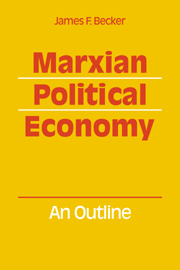Book contents
- Frontmatter
- Contents
- Acknowledgments
- Introduction
- PART ONE THE REPRODUCTION SCHEMES
- 1 Methodological glasses for the longer view
- 2 Simple and complex accumulation: the productive consumption of capital
- 3 Unproductive consumption: its historical and theoretical relevance
- PART TWO THE LABOR THEORY OF VALUE
- PART THREE RELATIONSHIPS BETWEEN PRICES AND VALUES
- PART FOUR THE DEVELOPMENT OF CLASS STRUCTURE AND RELATIONSHIPS
- Notes
- Index
1 - Methodological glasses for the longer view
Published online by Cambridge University Press: 07 October 2011
- Frontmatter
- Contents
- Acknowledgments
- Introduction
- PART ONE THE REPRODUCTION SCHEMES
- 1 Methodological glasses for the longer view
- 2 Simple and complex accumulation: the productive consumption of capital
- 3 Unproductive consumption: its historical and theoretical relevance
- PART TWO THE LABOR THEORY OF VALUE
- PART THREE RELATIONSHIPS BETWEEN PRICES AND VALUES
- PART FOUR THE DEVELOPMENT OF CLASS STRUCTURE AND RELATIONSHIPS
- Notes
- Index
Summary
An approach to historical processes
As everyone knows, the main theses of Marxian political economy are two in number. The first is that conflict among social classes is a prime mover of history. The second is that the exercise of the productive force of social labor is a predominant and ultimately decisive concern of man in society. We begin with a simple elaboration of these theses and with the simple relation that they bear to each other. There is but one preliminary observation to be made.
The basic postulate is that of an evolving universe moving under the impress of definite laws of development, although not in a deterministic fashion as is sometimes implied in rigid concepts of law. The laws controlling the reproduction of social life are not at all obvious; thus there is a general problem of methodical procedures to be faced. Special methods of inquiry are required, and it is at this juncture that the two theses referred to may be brought to the fore. Their function is heuristic in the first instance. They are hypotheses serving as guides for the investigator, helping him to extract from the historical context the specific laws controlling the reproduction of social life. The guides to inquiry of which Marxism avails itself are numerous, of course; we single out only two that were preeminent in Marx's own study of historical development.
- Type
- Chapter
- Information
- Marxian Political EconomyAn outline, pp. 19 - 38Publisher: Cambridge University PressPrint publication year: 1977



